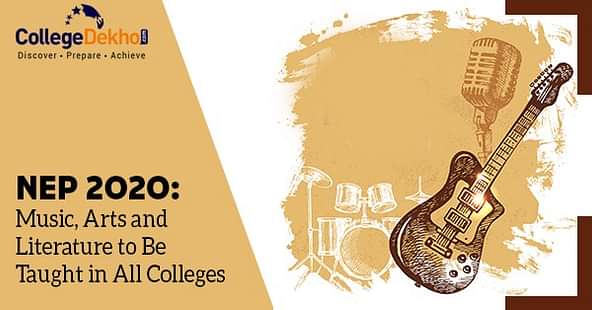One of the recommendations made by the final draft of NEP 2020 is the inclusion of music, arts and literature subjects in all Higher Education Institutions (HEIs). Here is our detailed analysis of this move and how it stands to benefit the education system in India.
- New Education Policy (NEP) 2020
- Music, Arts and Literature to be Taught in All Colleges
- Challenges Faced by Higher Education in India
- Vision of the New Education Policy for Higher Education in …
- Multidisciplinary Education in Colleges
- NEP Recommendations for Multidisciplinary Higher Education in India
- Benefits of a Multidisciplinary Higher Education System

The New National Education Policy (NEP) 2020 included by the Ministry of Education has introduced many changes to reform the state of Higher Education in India. The policy aims to transform higher education in India from being a piece of degree-granting machinery to a platform that nurtures the creative talent of an individual. The Education Ministry envisions to provide quality higher education to all students in India.
A part of the changes introduced by the NEP 2020 is the move to introduce music, arts and literature subject in all of the colleges in India. No matter which course a student is pursuing, whether it be engineering or management, they will be able to choose subjects that are otherwise clubbed under the banner of 'arts' as a part of their course. Students will also be provided with credits, for completing these courses, which will be counted towards their overall course completion goals. The shift is intended to bring education in India up to the standards and requirements of the 21st century.
In this article, we take a look at the NEP's move to turn all HEI in India into multi-disciplinary institutions including the key challenges faced by higher education in India and the benefits of this change.
New Education Policy (NEP) 2020
NEP 2020 is a new policy that has recently been finalised by the Ministry of Human Resource and Development (MHRD). Under the proposed changes of the NEP 2020, MHRD has now been renamed to Ministry of Education. NEP 2020 is an overhaul of the current system of education in India, which was developed in 1986 and has remained largely unchanged since then.
NEP 2020 has received a positive reaction from educationalists, scholars and students in India. It has gathered large-scale support in the news as well as on social media as it brings in changes that are considered long-overdue.
Music, Arts and Literature to be Taught in All Colleges
Multidisciplinary departments will be set up in all educational institutions. The following departments will be set up in all HEIs:
Literature
Music
Language
Philosophy
Dance
Theatre
Education
Sports
Translation and Interpretation etc.
This will be applicable to specialised educational institutions such as the Indian Institutes of Technology (IIT) and the Indian Institute of Management (IIM). This is a part of the overall motive of NEP 2020 to create a more holistic system of higher education in India. Let's take a look at the observations and recommendations made in the policy in more detail.
Challenges Faced by Higher Education in India
NEP 2020 identifies several problems that plague the current system of higher education in India. Some of the main problems identified by NEP include:
There is less focus on the development of cognitive skills of a student and what will be the outcome of their learning.
Students are divided into separate streams quite early on in their schooling, which limits their education into very narrow areas.
There is a rigid separation between different streams, which does not allow students to opt for subjects out of their streams.
Universities and colleges have very little focus on research.
Since there are large affiliating universities, it is resulting in low standards of education.
These were some of the main issues that NEP 2020 aims to solve.
Vision of the New Education Policy for Higher Education in India
Some of the major visions that NEP 2020 has towards the higher education system of India are:
Making undergraduate education in India more multidisciplinary and
Enhancing the student experience through a revamped curriculum, pedagogy, assessment and support.
Having one college in every district and HEIs providing education in local languages.
Having a single regulator for HEIs etc.
Also Read: New Education Policy will Make India a Knowledge Super Power: President Kovind
Multidisciplinary Education in Colleges
The New Education Policy (NEP) will move the higher education in India towards large multidisciplinary universities and HEI clusters. The inspiration for this recommendation has been taken from the ancient universities of India. NEP 2020 cites Takshashila, Vallabhi, Vikramshila and Nalanda as the institutions behind its inspiration. It calls for an urgent need to bring back this system of Indian education in which universities had thousands of students studying in multidisciplinary environments. There are many countries, including Singapore, where this kind of an education system is being used and proving to be effective.
NEP Recommendations for Multidisciplinary Higher Education in India
NEP discusses the ancient Indian education system in which subjects such as science and medicine were clubbed as 'arts' or 'Kalaas' along with subjects such as communication, vocational skills, singing etc. It plans to bring the practice of liberal arts or knowledge of many arts into the Indian education system. NEP aims to take a more holistic approach towards providing higher education in India.
Given below are the highlights of the NEP's recommendations to move India towards a more multidisciplinary higher education system.
Complete Revamp of HEIs in India
NEP does not plan merely an incremental but a complete revamp of higher education in India. It wants to shift the image of a university to a place of higher learning providing education in multiple streams. The policy will assess humanities subjects along with the STEM studies and increase the level of research in Indian universities.
Multidisciplinary Education and Research Universities (MERU)
NEP talks about setting up public universities offering multidisciplinary education. These universities will maintain educational standards comparable to those of IITs and IIMs, and will be the face of quality education in India.
Also Read: Benefits of Students Learning Coding from Class 6 - Pros & Cons
Credit-Based Courses and Projects
All HEIs will have credit-based courses in projects in the fields of community engagement, environmental education in areas such as climate change, waste management, management of biological resources and biodiversity etc.
Providing Value-Based Education
Education will not just be a means to land a good job. Instead, NEP proposes to change the perception of HEIs to places of learning that develop human values and skills in a student. It talks about inculcating the values of truth, righteous conduct, peace, love and non-violence in students along with building a scientific temper and life skills.
Also Read: New Education Policy 2019: Many Changes Recommended, States, UTs to Play Important Role
Benefits of a Multidisciplinary Higher Education System
The National Education Policy lists several benefits of a quality higher education system that promotes multidisciplinary learning. It highlights the need for setting up an education system which promotes the holistic scientific and creative development of individuals. Given below are some of the benefits of introducing music, arts and literature in all colleges.
It will aid in a more holistic development of knowledge and personality of students, including their intellectual, social, physical, emotional, moral and aesthetic capacity.
It will equip students with 21st-century skills and update the education system as per the modern requirements.
Multidisciplinary education will function in increasing the general awareness of students and enhance the enjoyment of the learning process.
NEP 2020 will make Indian HEIs more aligned with Industry 4.0.
It will provide students with the mental capacity to understand and respond to the modern global challenges.
NEP promises many radical changes to the Indian education system. It will call to action not only the schools and colleges but the overall educational fraternity, the central and state governments, and the teachers and faculty members as well. The changes will be gradually introduced over time. However, students and education experts will be awaiting more information about how the Education Ministry plans to carry out this monumental task that it has placed in front of itself.
Check these other related articles on the changes proposed by the New Education Policy on the Indian system of schooling and higher education.
If you have any queries or doubts about the New Education Policy, you can discuss them with us on the CollegeDekho QnA Zone. For help with admissions, please feel free to reach out to us at 18005729877.

















Similar Articles
Top Institutes with 100% Job Placements in 2023-24: Highest Package, Key Recruiters
List of Colleges in Delhi University: Affiliated/ Recognised Colleges in DU
Best Career Options After Qualifying UGC NET 2024
What is a Good Score in UGC NET 2024?
UPSC CSE 2025: Calendar (Out), Posts, Strategy, Registration & More
How to Check KVS Admission List 2024-25 (1st, 2nd, 3rd): Direct Link, Latest Updates, Steps for Class 1 & Above